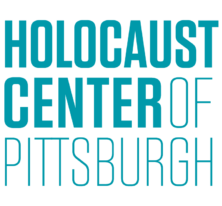
Photo by Brian Cohen
Profile by Audrey Coleman

The LIGHT Education Initiative is a local organization that wants to inspire, prepare and empower students for leadership roles in Holocaust, genocide, and human rights education, remembrance, and advocacy. LIGHT works in schools where students collaborate to counter identity-based violence and discrimination, antisemitism and hate speech.
LIGHT coordinators are the teachers who step up to do this work, teachers like Riverside Beaver County School District’s Meg Frank.
For Frank, many of her students were unaware of recent antisemitic events, as well as other events that occurred in history, such as the Holocaust. Frank saw the confusion among her students, coupled with an interest in the topics as well as a yearning to learn more about each and their impacts on the communities, both on a local and global level.
Because of her work in her community and school district, Frank has been selected as a recipient of a Righteous Among the Neighbors Award. Righteous Among the Neighbors stems from Righteous Among the Nations, an award given to Gentiles who helped save Jews during the Holocaust.
Frank is not someone who is a member of the Jewish faith. She doesn’t have any Jewish students from any of her classes, previous or current.
“At least not to my knowledge anyway,” Frank joked.
Frank has always had a passion for spreading awareness and exploring the topics of discrimination, especially within a classroom setting. She has been involved in several organizations that connect education and reduce discrimination in the classroom.
“I’m involved in Classrooms Without Borders,’ Frank said. “We actually went to Poland in 2019, which gave me a lot of insight and information [about the Holocaust]. And this past summer we went to Italy to study the ghettos and how they came about in Rome and Venice.”
To start teaching her students about the Holocaust and its long-term effects, in addition to antisemitism in the world today, Frank decided to integrate a unit in her tenth-grade English class solely dedicated to Jewish and Holocaust voices.
“In the beginning, I got lots of questions,” Frank said. “Like ‘what’s wrong with being Jewish,’ and ‘why did Hitler hate the Jews,’ which is what led me to create the unit to teach antisemitism, what being Jewish meant, what the faith was like and how it connected to their Christian faith.”
While it was only one unit in a set of many, the unit was a success among the few classes of experimental students. The students were engaged, actively participated and showed genuine interest in wanting to be educated on everything introduced to them.
After a handful of cycles teaching the Holocaust literature portion as a single unit in the year-long course, Frank brought a proposal to the administration: to form the single unit into an elective class. The course was approved and soon enough, students were extremely eager to sign up.
During the course, students look at texts that focus on experiences in the Holocaust, a mix of realistic fiction, memoirs and autobiographies. To have as wide a view as possible, Frank also pulls in voices from former Nazis and Gentiles who helped Jewish families.
“We read ‘[The Diary of] Anne Frank’, ‘The Devil’s Arithmetic’, ‘The Boy Who Dared’, ‘All But My Life’, ‘Maus’, and ‘Night’,” Frank said. “We’ll also look at podcasts, movies and even guest speakers if we have the chance. They’ll also do a research paper on a specific topic; this year’s was ghettos.”
Over the course of a few school years, the course went from a unit in tenth-grade English to an elective for upperclassmen, to a “core course,” a class students can take in place of their regular English class.
While the course is still fairly experimental, its place in the course catalog is permanent.
“Unfortunately right now, we’re in the process of cutting some electives, just because of budget cuts, but the fact that [Holocaust Literature] is a core course really saves it a bit,” Frank said. “It took lots of work to get it up to core standards, but now that it’s there it’s less likely to get cut compared to an elective.”
The texts and medias incorporated in the course often change to reflect more recent media. Frank also takes her students on immersive field trips, one of the most recent being a trip to the Holocaust Center. Somethingthe Holocaust Center does is rent out panels with artist’s depictions of tragic events like genocide and concentration camps.
“Every year I think of something else to add,” Frank said. “This year it was the panels. This summer Classrooms Without Borders is going to Prague and Vienna, so I’ll have something from that trip to add for next year.”
Throughout this whole process of integrating a new unit to teaching a full-blown class that centers around the Holocaust, Frank has really only had one goal: to make an impact on younger generations.
“If I can teach the same skills, the same processes that come up in a ‘regular’ English class, but with a topic that interests the kids and hopefully enlightens them, when they get out on their own, they’re more worldly too,” Frank said. “We can give them exposure to a lot of different things, and hope they take that into the world with them.”
